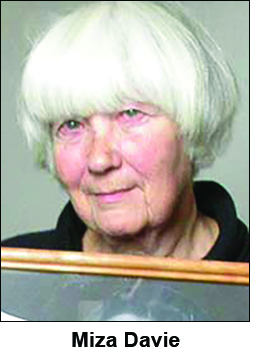In Canada, Remembrance Day is reserved for the 116,000 men who served and died in the five major conflicts the country has participated in – the Boer War, the First World War, the Second World War, the Korean War and the Afghanistan War – as well as the thousands more who served and have since passed.
 But we often forget that soldiers aren’t the only casualties of war. During the Second World War, 390,000 civilians, many of them children, died in France alone.
But we often forget that soldiers aren’t the only casualties of war. During the Second World War, 390,000 civilians, many of them children, died in France alone.
When the Germans first invaded France in May, 1940, it sparked a mass exodus of refugees. An estimated 8-10 million refugees fled their homes in an effort to escape the Nazi invasion – almost a quarter of the French population at the time.
Among the millions of refugees was former Orléans resident Miza Davie.
Born Mireille Bosc, Miza was just six years old when the Germans invaded France in 1940. It didn’t take long for the advancing force to takeover the entire country.
For the next four years, Miza and her two siblings were raised by their grandparents – first in Nimes in the south of France and then in Générac near Bordeaux – while their mother, who was a well-known radio personality in France, was forced to return to Paris to do propaganda.
Miza lived during extraordinary times and experienced joy, grief, sorrow and horror. After the war, she studied nursing and eventually immi-grated to Canada where she met her future husband, Syd Davie.
After retiring from nursing in 1994, Miza began writing a collection of short stories about her life as young girl growing up during the war. Prior to her passing in 2005, those stories were assembled in a self-published book entitled “A Child’s Memory of the Second World War”. Here is just one of those stories about the day her best friend was forcibly taken from their classroom, never to be seen again. They were both nine at the time.
My school friend Helena had two big black long braids. She had a very pale complexion and was slim.
That morning we were waiting in line for our daily ration of “milk” drink, each child holding their little enamel cup. Soon our turn came. The cup was filled with a mixture of lumpy, whitish grey fluid with yellow rings floating on the top, which was cod liver oil.
You had to pinch your nose to drink this mixture which left the taste of fish in your mouth for the rest of the day. It certainly put me off milk for the rest of my life.
Once we had finished our drink, we replaced our cup on the hook of our jacket which had our name as well as our school number on it. In case the school was bombed and we were hurt or killed, the number would help the authorities identify us and contact our mothers.
The school bell rang and we lined up in our various class groups and proceeded to each of our classrooms. Helena was with me. We sat beside each other at the same wooden desk.
That morning as we were having our math lesson the door of the classroom suddenly slammed open. Two tall, massive German officers entered the room, clacking the heels of their boots on the parquet. They went straight to the teacher’s desk and a loud voice with a strong accent said, “Do you have a child called Helena?”
All the children in the class were dead silent at their desks. My school friend Helena was getting very pale and started to shiver. I took her hand in mine. It was moist and clammy. I started to hold her hand tightly and tears started coming down her face. Then the two German officers directed themselves toward our desk. Helena’s heart was pounding so hard I could see her chest moving under her blue school pinafore.
One of the officers grabbed Helena, who by then was screaming and crying at the same time with fear. She suddenly was lifted up by the two officers and dangled in the air. I was holding on to her hand so tightly that the other German officer had to hit my hand to break my grip. The pain was so bad I started to cry. The next thing, when I looked up, Helena was gone, dragged out of the classroom like a criminal.
That night when I arrived home I was feeling so sad, so bitter and mad at the soldiers. I asked my mother, “Why did they take my friend away?” “She is Jewish,” my mother replied.
She then grabbed me in her arms and held me tight. Not one person has an answer to this terrible crime. I hope this will stop one day.